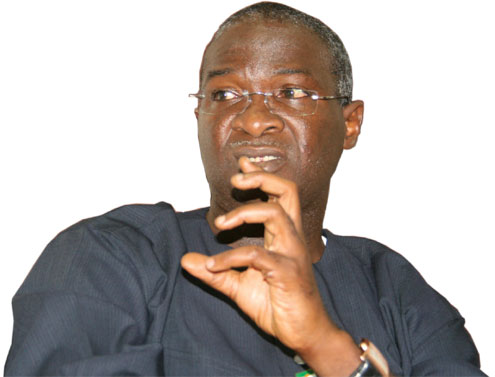…Says law will help government discharge responsibility to citizenry more efficiently
Lagos State Governor, Mr. Babatunde Fashola (SAN) on Monday signed into law two bills establishing the State Emergency Command and Control Centre and the Regulation of Smoking in Public Places, stating that the two bills would help to strengthen the administration to more efficiently discharge her responsibility to protect life and property.
The Governor, who spoke at the Conference Room of the Lagos House, Ikeja, reiterated that the state’s commitment to public safety and public health is stronger than the question of whether the law to regulate smoking in public places will work or not adding that the State owes a moral obligation to first intervene
“It is to tell people that it is a moral situation in which first we would intervene to protect people with clear evidence that now abound about the dangers of secondary smoking, increasing diagnosis of cancers and of causal and effectual relationship that it has with smoking.
“Yes, smokers may have a right to choose to continue with a habit that is clearly unhealthy, but we owe a duty to also prevent people who choose to live a healthy life the right to have that healthy life”, he added.
Governor Fashola stressed that similar scenarios have played out in some cities like Paris, London, New York in recent times and that the outcry then was that some of the clubs in London would shut down because it was going to be bad for business, just as cafes in Paris would be closed, but after all said and done, life has continued with all of the societies being the healthier by the measure.
On the law to establish the Command and Control Centre, Fashola said by establishing emergency lines of 767 and 112, the government has created a path where none existed in order to improve the capacity to respond to life threatening incidents and emergencies in the real sense of it.
“As for the emergency line, we have broken a path here where none existed, we provided a three digit dedicated emergency line for Lagosians in order to improve our capacity to respond to life threatening event and emergencies in the real sense of it” ,he added.
Fashola reiterated that people must pay attention to what really is an emergency, because the way people have used the words- emergency or urgent shows that the word must really be defined.
“Those lines, the 767 and 112 are for emergency and nothing and nothing less, emergencies are often times for us, life threatening situations, very grievous threat to property or a combination of both and as the Attorney General said in his remarks, this is not a line to commend us or to ask for broken pipes to be repaired or complain about our neighbours making noise because we know that those are still service issues”.
“When the threat to life occurs, our capacity to respond makes the defining difference in what in real emergency management is referred to as the golden hour and during that period, if you clog the lines, then those who need the lines desperately are denied use of the assets, so it is not just the law that we will enforce, it is also an attitude and behavioural requirement that we must all resist the temptation to use that line unless there is an emergency”, he stated.
The Governor reiterated that such legislations are not unusual because in many parts of the world where similar facilities exist there has always been the temptation to misuse them but government has always taken corrective steps by enacting legislation and providing sanctions to show that it is wrong.
He informed that the State would soon be deploying what it calls the Citizens Management Response Centre because of its recognition that there are other service levels that are not emergencies but have a need to communicate with the government.
Fashola said the new Citizens Management Response Centre would leverage on what is already in place at the Command and Control Centre as there would be a different team to address all service issues like planning permits, readiness of Certificate of Occupancy, irregular water supply in the area or a transformer that is down.
“All those things that are not emergency or when you see refuse on the streets and we have not come to pick it, somebody has damaged the street pole, you can report like the I-report type of thing and we are almost there. We are actually testing but this is to ensure that we separate the emergency service from the day to day regular service”, he stressed.
Speaking earlier while giving insights into the new laws, the Attorney General and Commissioner for Justice, Mr Ade Ipaiye said the law on regulation of smoking in public places which was passed by the State House of Assembly has taken cognizance of the dangers posed by smoking in such places to the health of Lagosians.
He defined public places as places that have been designated as no smoking by existing laws and are automatically incorporated by the law. He further listed the following as part of no smoking areas; libraries, archives, museums, galleries, public toilets, hospitals and other health facilities, nurseries, day care centres and any facility used for the care of infants and children or adults, kindergartens, nursery, primary, secondary schools, public telephone kiosks or call centres, public transportation vehicles.
“Others are private vehicles where there are more than one occupant, school buses, restaurant, cinema, concerts and theatres, halls and any premises used for the assembly of members of the public for social, religious or recreational purposes, conference centres and exhibition halls. Shopping centres, factories and other premises that are non- domestic premises in which one or more person works”.
“It also includes premises which are being used wholly as a place of work and incorporate the entire premises of the State Secretariat and the Governor’s Office, Lifts and all common paths and any structure that is enclosed or substantially enclosed.
“It shall also constitute an offence to smoke in the presence of a child under the age of 18 in such a way, manner and place that may expose the child to any form of smoke and be in any other ways injurious to the child”, the law also stipulates.
The law allows the owner of certain public facilities like restaurant to designate a smoking area which must not be more than 10 percent of the entire size of the place and the owner must ensure that the no smoking area is fitted with smoke detectors.
According to the Attorney General, any person who smokes contrary to the provision of the law commits an offence and shall be liable on conviction to a fine of not less than N15,000 or to an imprisonment for a term not less than one month and not exceeding three months or both, or other non-custodial punishment that the judge may deem fit.
He said the law establishing the State Emergency Command and Control Centre, regulate the making of telephone calls to the centre and connected purposes shall make the centre a body corporate with perpetual succession and a common seal.
“The law disallows any company or organization either public or private from using or displaying the numerals 112 or 767 or any approved emergency number in the name of their company or organization for advertisement except with authorization”, he added.
The Attorney General also said the law provides that no person shall unless for the purpose of informing the centre of the occurrence of any life threatening events call the emergency numbers.
“Where a person misuses or persistently misuses the emergency numbers of the Centre, the person commits an offence and is liable on conviction to penalties stipulated in under the new law”, the Attorney General stressed.
Among those who witnessed the event were the Deputy Governor, Hon (Mrs) Adejoke- Orelope Adefulire, Deputy Speaker of the State House of Assembly, Hon Kolawole Taiwo and members of the State Executive Council including the Special Adviser to the Governor on Political and Legislative Matters, Hon Muslim Folami, Secretary to the State Government, Mrs Ranti Adebule, Commissioner for Information and Strategy, Mr Lateef Ibirogba and Special Adviser on Education, Mr. Lateef Raji.
 Hottestgistnaija.com
Hottestgistnaija.com





